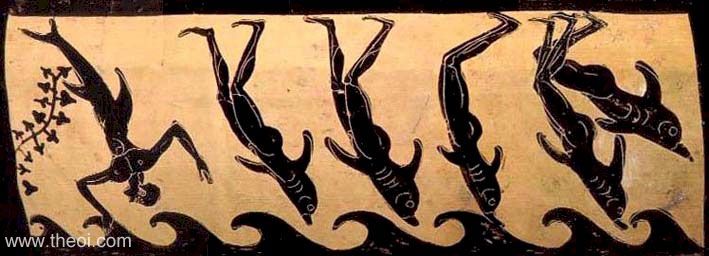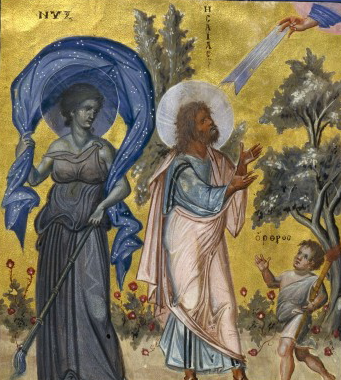From the Orphic Hymns, translated by Taylor, 1792.
II. TO NIGHT [NYX]
The Fumigation with Torches.
Night [Nyx], parent goddess, source of sweet repose,
from whom at first both Gods and men arose,
Hear, blessed Venus [Kypris], deck’d with starry light,
in sleep’s deep silence dwelling Ebon night!
Dreams and soft case attend thy dusky train,
pleas’d with the length’ned gloom and fearful strain.
Dissolving anxious care, the friend of Mirth,
with darkling coursers riding round the earth.
Goddess of phantoms and of shadowy play,
whose drowsy pow’r divides the nat’ral day:
By Fate’s decree you constant send the light
to deepest hell, remote from mortal sight.
For dire Necessity which nought withstands,
invests the world with adamantine bands.
Be present, Goddess, to thy suppliant’s pray’r,
desir’d by all, whom all alike revere,
Blessed, benevolent, with friendly aid
dispell the fears of Twilight’s dreadful shade.
XII. TO SATURN [KRONOS]
The Fumigation from Storax.
Etherial father, mighty Titan, hear,
great fire of Gods and men, whom all revere:
Endu’d with various council, pure and strong,
to whom perfection and decrease belong.
Consum’d by thee all forms that hourly die,
by thee restor’d, their former place supply;
The world immense in everlasting chains,
strong and ineffable thy pow’r contains
Father of vast eternity, divine,
O mighty Saturn [Kronos], various speech is thine:
Blossom of earth and of the starry skies,
husband of Rhea, and Prometheus’ wise.
Obstetric Nature, venerable root,
from which the various forms of being shoot;
No parts peculiar can thy pow’r enclose,
diffus’d thro’ all, from which the world arose,
O, best of beings, of a subtle mind,
propitious hear to holy pray’rs inclin’d;
The sacred rites benevolent attend,
and grant a blameless life, a blessed end.
XLVII. TO SABASIUS [ZABAZIOS]
The Fumigation from Aromatics.
Hear me, illustrious father, dæmon fam’d.
Great Saturn’s [Kronos’] offspring,
and Sabasius [Zabazios] nam’d;
Inserting Bacchus, bearer of the vine,
and founding God, within thy thigh divine,
That when mature, the Dionysian God
might burst the bands of his conceal’d abode,
And come to sacred Tmolus, his delight,
where Ippa dwells, all beautiful and bright.
Come blessed Phrygian God, the king of all,
and aid thy mystics, when on thee they call.
LXXXIV. TO SLEEP [HYPNOS]
The Fumigation from a Poppy.
Sleep [Hypnos], king of Gods, and men of mortal birth,
sov’reign of all sustain’d by mother Earth;
For thy dominion is supreme alone,
o’er all extended, and by all things known.
‘Tis thine all bodies with benignant mind
in other bands than those of brass to bind:
Tamer of cares, to weary toil repose,
from whom sweet solace in affliction flows.
Thy pleasing, gentle chains preserve the soul,
and e’en the dreadful cares of death controul;
For Death [Thanatos] and Lethe with oblivious stream,
mankind thy genuine brothers justly deem.
With fav’ring aspect to my pray’r incline,
and save thy mystics in their works divine.
LXXXV. TO THE DIVINITY OF DREAMS [ONEIROI]
The Fumigation from Aromatics.
Thee I invoke, blest pow’r of dreams [Oneiroi] divine,
angel of future fates, swift wings are thine:
Great source of oracles to human kind,
when stealing soft, and whisp’ring to the mind,
Thro’ sleep’s sweet silence and the gloom of night,
thy pow’r awakes th’ intellectual fight;
To silent souls the will of heav’n relates,
and silently reveals their future fates.
For ever friendly to the upright mind
sacred and pure, to holy rites inclin’d;
For these with pleasing hope thy dreams inspire,
bliss to anticipate, which all desire.
Thy visions manifest of fate disclose,
what methods best may mitigate our woes;
Reveal what rites the Gods immortal please,
and what the means their anger to appease:
For ever tranquil is the good man’s end,
whose life, thy dreams admonish and defend.
But from the wicked turn’d averse to bless,
thy form unseen, the angel of distress;
No means to cheek approaching ill they find,
pensive with fears, and to the future blind.
Come, blessed pow’r, the signatures reveal
which heav’n’s decrees mysteriously conceal,
Signs only present to the worthy mind,
nor omens ill disclose of monst’rous kind.
LXXXVI. TO DEATH [THANATOS]
The Fumigation from Manna.
Hear me, O Death [Thanatos], whose empire unconfin’d,
extends to mortal tribes of ev’ry kind.
On thee, the portion of our time depends,
whose absence lengthens life, whose presence ends.
Thy sleep perpetual bursts the vivid folds,
by which the soul, attracting body holds:
Common to all of ev’ry sex and age,
for nought escapes thy all-destructive rage;
Not youth itself thy clemency can gain,
vig’rous and strong, by thee untimely slain.
In thee, the end of nature’s works is known,
in thee, all judgment is absolv’d alone:
No suppliant arts thy dreadful rage controul,
no vows revoke the purpose of thy soul;
O blessed pow’r regard my ardent pray’r,
and human life to age abundant spare.
 The ship has sailed, I tell you.
The ship has sailed, I tell you.